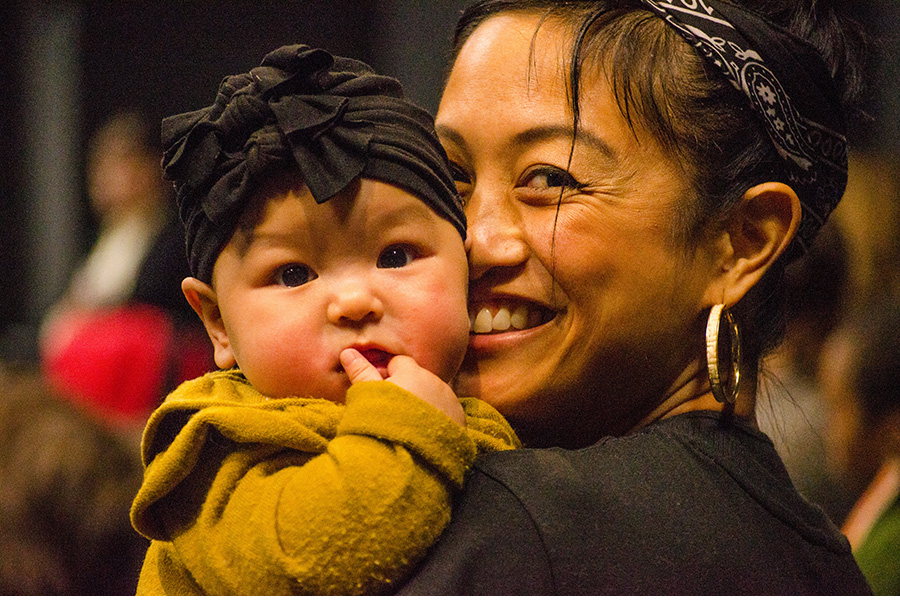This is part of a package of stories, Care for Caregivers.
Last December at the Public Theater, the Parent Artist Advocacy League hosted an extraordinary gathering of theatre leaders, artists, and academics to share best practices and challenges around support for caregivers in the American theatre. The day of inspiring and information-packed sessions culminated with a Q&A between Emily Mann, outgoing artistic director and resident playwright of Princeton, N.J.’s McCarter Theatre Center, and Mary Hodges, a New York City-based actor and director. The two spoke about their varied experiences as working parents—both the obstacles they’ve faced and the progress they’ve made in rendering their field more responsive and responsible to parent artists. The following has been edited and condensed for clarity.
Mary Hodges: I’m going to read a quote from an article about you from 2009. You said, “Being a mother definitely made me a better artist, no question about it. You understand the human race by having a child and feeling that much love. It’s just astounding. It affects my writing, my mentoring and my giving to the education department in my raising money, all of it.” Being a mother-artist, reflecting on where you are now, what comes to your mind?
Emily Mann: I totally agree with myself.
Hodges: Great!
Mann: You know, as artists we all work from our experiences and our hearts and our guts and our mind. And until I had a child—I had great love affairs in my life and I also adored my parents, but that love for a child is so particular. And so much of the human race does experience that love in their lives. I felt like I had actually finally joined the party, and I could speak to people in a different way, having had that experience. It’s like when you’re a virgin, you don’t know what you don’t know. Parenthood is the same. And let me tell you: If you were enjoying being a parent, just wait till you’re a grandparent. It’s just mind-blowingly wonderful. It’s that level of love, and it’s different; you understand the generations and you understand aging and you understand legacy, and you understand the need to give and how to give in a completely different way that is so enlivening and enriching. That’s all gone into my work. I don’t know about you, but I just think no experience is wasted when you’re in the theatre. Whether it’s tragic or whether it’s joyous or anything in between. We put all that into our work.
Hodges: What advice would you give your younger self—as a mother, director, playwright, producer?
Mann: Well, I can say, from being on this side of it, that I would tell my younger self: It’s going to be all right. You can be a good parent and a creator and worker in the theatre. I always seemed to have tech when my son had an important event, like either my own or someone’s in the theatre that I needed to be at, or a dress rehearsal, and I kept thinking, What am I missing, and what is this costing him? And then when my son met his wonderful wife, my daughter-in-law, he said, “I love her because she is as passionate about her work as you are. I didn’t want to marry someone who wanted it to be all about me. I wanted what you had.” It was like, wow—I didn’t know whether that worked or not! And my daughter-in-law said to me just before they got married, “I knew I could marry your son because of how much he loves you. I always judge men by the relationships they’ve had with their mothers, and he loves and admires you, so I feel like I’m okay.” And again, you know—tears. So that’s what I would tell myself: It’s going to be okay. There were hard times. His adolescence nearly did me in. He needed me more then than when he was 3.
Hodges: That’s not encouraging! My son’s 9.
Mann: Oh, sorry! That’s when I realized I had to rearrange things at the theatre, so that I did not miss dinner with him. I had to lock it down. I could not let him out; he was going to run off the cliff. I just took him by the scruff of the neck and said, “No, you don’t.” I got my mother involved. She was a great grandmother. She sat him down and said, “Oh, no, no, no, no.” He listened to her when he couldn’t listen to me or my husband. But it can be done. That’s what I would tell my younger self. It’s going to be good, and he is not going to feel like you gypped him at all. Quite the contrary. My mother used to say that a happy, fulfilled mother is a good mother.

Hodges: What are some of your most memorable early experiences as a parent in the theatre?
Mann: There are three. One was, my son was like two weeks old and nursing, and I had a reading of my then-new play Execution of Justice at La MaMa. I was going to be directing it, and then I thought, well, how am I going to do this? This was like 1983, so it’s not quite the ’60s, but the people in the room all grew up then, so I basically slapped him on my breast and directed with him nursing; I couldn’t take too many breaks, ’cause it was a new play and it was a mess and I had to get it together for the reading. No one batted an eye. The milk didn’t dry and he was perfectly happy.
Another one I remember is, I directed three months after he was born. Mark Lamos at Hartford Stage had never had a director who was—I think I may have been the first woman who directed there, but certainly he’d never had a mother directing there. And he said, “What do you need?” And I said, “I’m going to need to bring a woman with me. We’ll have to schedule the breaks around my nursing schedule. I’ll need another apartment with a crib.” He went, “Done.” That was the first and best time I ever had, but it was because he was a good friend and he wanted me there. After that he used to call it the “Emily clause”; when other women would come to direct there, he knew to ask, “What do you need?” And by the way, I did not pay for that extra apartment or that crib; I did pay for the childcare. But it worked. I could do it.
The third one is the great Alan Schneider, you know, who gives the Alan Schneider Award at TCG its name—he was directing at the Guthrie when I was an apprentice there. Women weren’t directing at that point. I told him that’s what I wanted to be doing, and he said, “You know, a pram in the hallway is a death to art.” So basically, if you want to be a director, you cannot be a mother. And he was so wrong. I liked proving him wrong!
Hodges: Are you still surprised when you hear other parents talk about the struggle for support, or having to ask for it when they get jobs?
Mann: No, not surprised in the least. I had to fight for it every place I went when I was freelancing. And then at McCarter, I wanted to make sure it was a child-friendly theatre, a family-friendly theatre. I wanted to make sure everyone had what I had to fight so hard for and that people felt very supported in it. So obviously, staff childcare leave and all of that. But we also set up dressing rooms for when there’s a nursing mother, there are places to either pump or nurse. It just depends on how far along people are and what their needs are; we do our best to help them out. When Nicole Ari Parker came eight years ago, she had her two kids over the summer, and she said, “What am I going to do with them while I’m working?” Our wonderful production stage manager said, “My kids love the Y camp, and we can figure out how company management can get them there and pick them up.” We were always working to see how to make it work. I’m often told we’re a rarity. I’m not surprised to hear that. But I think sometimes you just have to tell people what you need. If they say no, then you have to have a Plan B or C.
Hodges: I’m always thinking, how can we get that word “surprise” taken away, so they learn to expect or think to ask if you have caregiving needs? I think if, en masse, all of the parent artists spoke up—this is a start, having a summit. We need to probably have them twice a year to make enough noise to get it noticed.
Mann: I think that’s right. The more it gets into the conversation, the better. A lot of people who are in charge don’t think about it because it has never been part of their lives. If they were guys and they had families, then it wasn’t their issue in those days—there was someone at home taking care of things. Then there are a whole lot of folks who are childless who run theatres, and it doesn’t reach their consciousness. So having the conversation is the beginning I think. And, say with Mark Lamos, he was really happy to be a pioneer in this. He felt very good about himself. So you can give them the opportunity to feel that they’re doing the right thing.
Hodges: You mentioned your mother as a support system. What other support systems did you have in place? Your son at the time you went over to the McCarter was 7, 6?
Mann: Six, yes, and I was a single mom. I was no longer married to his dad. So I was a single mother running a theatre. And I took the job because I wanted to keep my son, so it could not fail. I did not have a partner at home supporting me. I went with a huge cut in salary and had been saving since—I don’t know how I knew to do this, but I was saving since I was a kid for childcare, because I always knew I wanted a child, and I always knew I was going to do something with my life. So I spent a great deal of my salary on childcare. I had everything from live-in people for a while, and then part-time workers when he was more in school. And I had women friends who were incredible, and some of them would take their kids with my son and do afterschool things together so that I didn’t feel bad, ’cause I couldn’t get home till 6. And then I had a fantastic second husband.
Hodges: You spoke a bit about what you’ve put in place because of the lack of support you had received, and you’re setting an example for what other institutions can do. I imagine smaller theatres might think, “Our budget isn’t like the Public or Signature, so we can’t do much.” But there’s always something that you can do. I’ve brought my son if there’s a space—any little space in the back that I can bring my son and he can have his headphones on and his tablet. That’s fine.
Mann: Absolutely right. It’s also shifting attitudes. I worked with a stage manager for 28 years who was able to be a mom too. We made nap rooms when she was nursing, and she had her own place to go when her kids were in school or in camp. So I have this thing with her: I tell her, “I want you to have a conversation with every single parent, whether they’re acting, directing, designing, whatever it is—find out what their needs are.” And she just does that. If you come into a situation where you’re freelancing, if you’re directing you can say to the stage manager, “This is a child-friendly room.” You can set rules and ask these questions. It’s communication. More people will be open when you know what you need; you need to help the management understand what you need.
Hodges: I’ve been on both sides of it, ’cause I’m an actor and a director. I got tired of sitting at home and thinking, “I can’t do this job.” So I always phrase it in a way where I don’t necessarily ask; I just say, “I don’t have childcare in place for this rehearsal, so my son will be coming, and this is what we’ll have to do.”
Mann: Yes, that’s good. And in a rehearsal room, we have to be helpful to people who don’t know. For example, on one of the last shows I did, Rachel Nicks, one of the actors, was nursing. So we had nursing rooms and all that sort of stuff, but she was getting into a different schedule, and she was thinking she had to miss notes. Miss notes? No! So I said, “Why don’t you nurse during notes just sitting there?” And I said, “Is everyone okay with that?” And it’s interesting, the men who were parents were all going, “Yes, great.” But this one kid who had just graduated from Juilliard, went, “You mean…?” And then we all realized it would be so good for him! So she nursed during notes, and it took about a second for him to get cool with it. It was a first for a lot of people, but it was like, that’s just what we do here. Yeah.
Hodges: Are there any audience questions or comments?
Audience question 1: I have a close friend who is a freelance director, who booked a gig at a regional house. She had the standard things she asked for to accommodate her with her kid—her son was young, and she asked for the larger apartment and the specific schedule for rehearsals, etc. Not only did they say no, they retracted the job offer. But instead of accepting that and being internally angry, she raised a stink. She was like, “I just want you to know, I’m not going to be quiet about this. I’m taking this to my agent. I may take it to a lawyer. Is this the road we want to actually go down here, or can we have a conversation?” I was really proud of her, because it ended up working. She got the job, and they conceded to a lot of stuff. Now she has a good relationship with this theatre, and that managing director learned a good lesson. I wanted to put that in the room: I honestly think in this day and age, don’t even take no for an answer. I think there’s always something that you can get.
Mann: That’s a great story.
Audience question 2: Emily, it was very reassuring to hear that you would tell your younger self that everything’s going to be okay. I’m just wondering if there’s anything you look back on and would do differently as a mother in the field.
Mann: Well, you know, no one’s a perfect parent, right? I’m sure there are a lot of things. But no, oddly, it’s a nice feeling, given how it’s all worked out. What I would do differently is I would beat myself up less about, “Oh my goodness, maybe I haven’t done enough for my son.” You know, Princeton is sort of split between a university community and a suburban community. And let me tell you, suburban moms would say some really cutting things to me about, “Oh, your son must feel so alone.” Things like that. I would absorb that and hurt a lot over it and worry about it a lot. And I think what I would tell my younger self now: That’s their problem.
I really made it a mantra, what my mother said, that a happy and fulfilled woman is a good mother. And if you’re sitting at home blaming your child because you didn’t do the job you really wanted to do, or you didn’t quite do your best at that job because you said, okay, I am going to send my assistant to tech, and you’re beating yourself up for not being the artist you could have been. No, no, no, no, no, no. Kids are resilient. If they’re loved, they’re loved. If you’re a happy, fulfilled woman, this is what you can give ‘em. I’m sure I made a lot of mistakes along the way in terms of the details, but I did keep my eye on the ball, and I also surrounded myself at McCarter with extraordinary colleagues and some amazing young women. We were there for each other. Love your work, do your work, love your child, and the rest will follow. I really believe that.






